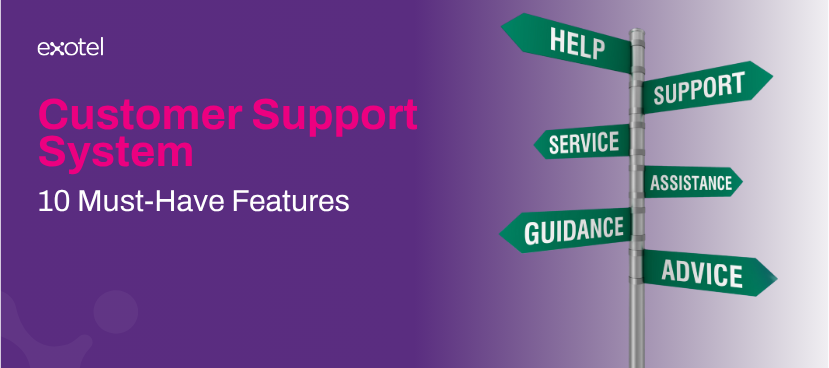Winning a customer takes time, effort, and trust. But loss of a customer can happen in seconds. In a world where everything is just a tap away, people expect quick and effortless support. If they have to wait too long or jump through hoops, they’ll simply move on.
This is where the definition of good customer service has changed. It isn’t just about answering queries but creating an experience that makes people want to stay with your brand. This takes the right systems, processes, and mindset to ensure every interaction feels smooth and hassle-free.
More importantly, customer support isn’t just the job of one department anymore. It’s a collective effort of IT, operations, frontline agents, and leadership in ensuring customers get the help they need, when they need it.
So, what does it take to build a truly effective support system? This blog will break down 10 essential features that can help you deliver faster resolutions, better experiences, and happier customers.
Must-Have Features in a Customer Support System
A well-structured customer support system can enhance the overall experience and prove its value to the business. When designed right, it streamlines interactions, improves efficiency, and keeps customers satisfied. Here are ten essential features every customer support system should have:
Omnichannel Communication
Customers today reach out through calls, emails, social media, or live chat. A strong support system ensures all these touchpoints are well-integrated, so customers don’t have to repeat themselves across platforms. Maintaining conversation history across channels creates a smoother, more efficient experience.
Unified Agent Desktop
Speed and accuracy in support depend on how well-equipped agents are. A unified agent interface provides a 360-degree view of customer interactions, past purchases, and support history in one place. This transparency enables agents to offer more personalized and efficient assistance without toggling between multiple systems.
Integrated Ticketing System
A robust customer support system merges interaction management with ticket tracking, ensuring clear accountability between frontline agents and backend teams. When tickets from different channels appear in a single dashboard, resolution times improve, and customers get the assistance they need without delays.
Live Chat for Instant Support
Live chat has become a must-have to deliver instant solutions. Customers expect real-time answers, and a proactive chat feature helps address common queries swiftly. Businesses can also use AI-powered chatbots to handle FAQs and free up agents to focus on complex issues.
Self-Service Portal
Not every issue requires an agent’s intervention. A well-structured self-service portal empowers customers to find answers on their own. This can reduce wait times and ease the burden on support teams. Customers get quick solutions at their convenience with an easy-to-understand knowledge base, FAQs, and how-to guides.
Smart Ticket Prioritization
Not all tickets hold the same urgency. A smart customer support system automatically prioritizes cases based on SLA deadlines, pending responses, or ticket complexity. This ensures high-priority issues are addressed first, streamlining workflow and enhancing service quality.
Customer Sentiment Analysis
Advancements in technology have made it easier for businesses to gauge customer emotions in real time. Modern customer support systems leverage AI-driven sentiment analysis to assess how a customer is feeling during an interaction. For instance, speech-to-text technology can detect specific words or tones that indicate frustration, urgency, or satisfaction. This insight helps agents prioritize tickets that require immediate attention and lead to a better customer experience.
Comprehensive Knowledge Base
Support agents deal with various queries across multiple products and services. Expecting them to memorize every detail is unrealistic. That’s where an up-to-date knowledge base becomes invaluable. A well-structured knowledge repository allows agents to quickly access accurate information while resolving customer issues. Smart search functionality further enhances efficiency by helping agents find the most relevant answers without delay.
Internal Chat for Team Collaboration
Quick problem-solving often requires teamwork. A built-in internal chat feature allows support agents to communicate with colleagues or seek guidance from subject matter experts without switching platforms. It also enables supervisors to send important updates or assist agents in handling complex cases, ensuring faster ticket resolution and smoother operations.
Mobile-Optimized Support System
With mobile usage skyrocketing, customers increasingly seek support on the go. This means brands must ensure their customer service experience is just as seamless on mobile as it is on desktop. A robust mobile app for the support system allows agents to manage tickets, access customer information, and respond to queries from anywhere. A mobile-friendly platform enhances responsiveness and provides businesses with a competitive edge.
A great customer support system does not just resolve queries. It creates an experience that keeps customers coming back. Businesses that prioritise seamless, efficient, and empathetic support gain a lasting competitive edge by investing in the right tools and technology. It’s a commitment to building stronger customer relationships and driving long-term success.





